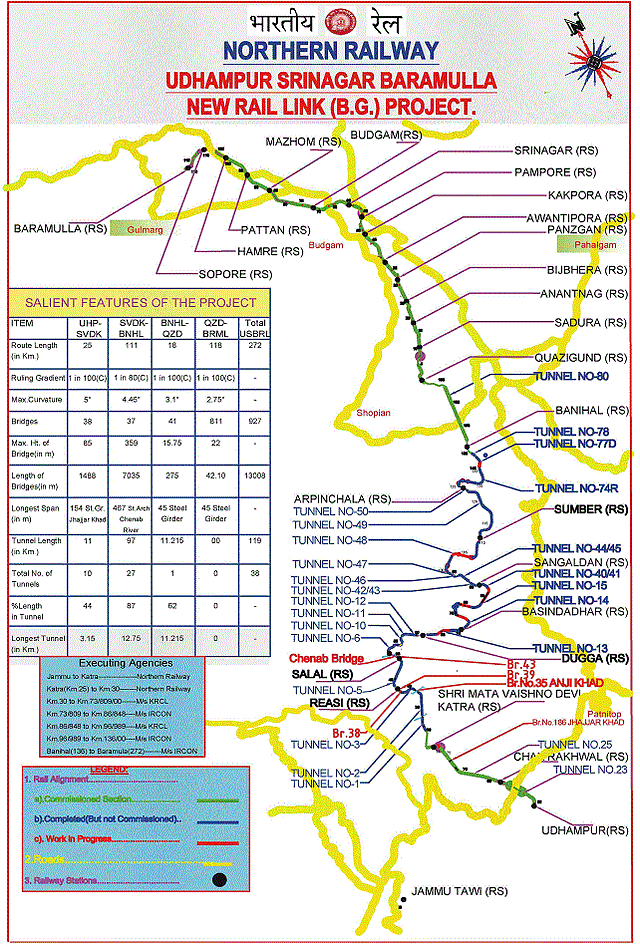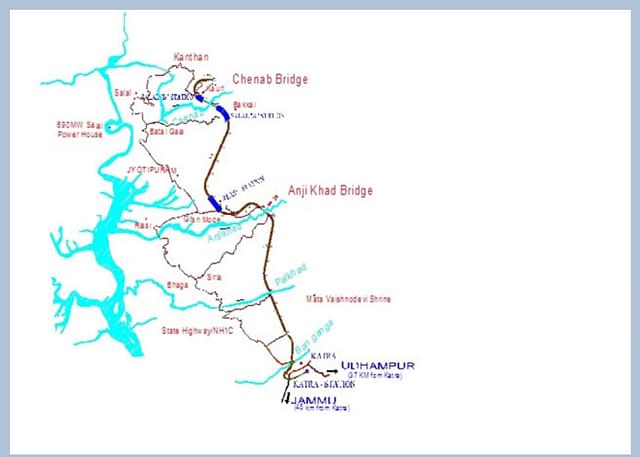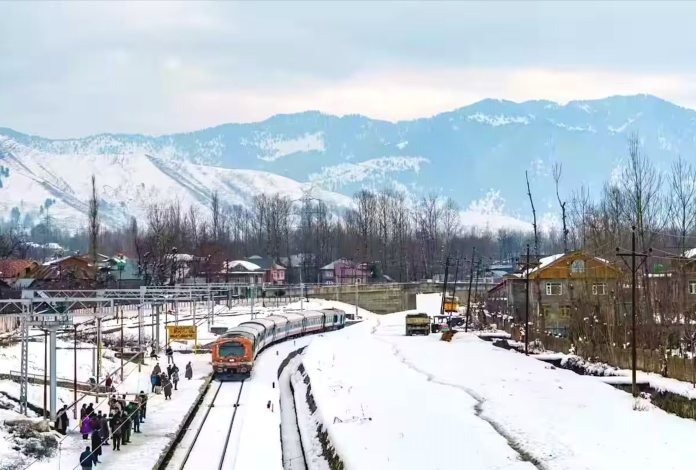The new Udhampur-Srinagar-Baramulla Rail Link (USBRL) project in India faced unique challenges due to the extreme cold temperatures in the Jammu and Kashmir region during winter, which can drop to as low as minus eight to minus 12 degrees Celsius.
To address these challenges, engineers at the Rail Coach Factory (RCF) in Kapurthala implemented innovative solutions:
Double-Walled Composite Insulated Water Tanks: To prevent water from freezing in the train’s tanks, the RCF designed double-walled composite insulated water tanks with capacities ranging from 450 to 685 litres.
These tanks resemble thermoplastic bottles and have an insulating layer of foam between the two walls. This design traps air, which helps maintain the water in liquid form in sub-zero conditions for approximately 16 to 20 hours. Although the water may remain cold, it won’t freeze, ensuring the functionality of toilets and taps.
Heated Pipes With Distributed Heating System: To prevent the freezing of water in supply pipelines, the RCF adopted technology from the defence services. They used heated pipes with a distributed heating system covered by insulation. This approach keeps the water at a temperature between five to eight degrees Celsius in a liquid state.
Energy-Efficient Geysers: To minimise energy loss, the RCF is installing geysers at the point of use in toilets. These geysers will heat only the amount of water needed by the users, reducing energy consumption.
Technology For Fuel Tanks: Similar technology is being employed in the fuel tanks for locomotives to ensure that the fuel remains in liquid form and doesn’t freeze in cold temperatures, as per The Hindu report.
Udhampur-Srinagar-Baramulla Rail link (USBRL)
The 272-km-long railway line from Udhampur to Baramulla joining the Kashmir Valley with the Indian Railways network under Udhampur-Srinagar-Baramulla Rail link (USBRL) project was sanctioned in 1994-95.
One of the most challenging works undertaken post-independence by Indian Railways, the project aims to provide an alternative and a reliable transportation system to Jammu and Kashmir.
In view of the importance of the USBRL project in providing seamless and hassle-free connectivity, it was declared as a “National Project” in 2002.
The alignment of USBRL involves construction of a large number of tunnels and bridges in highly rugged and mountainous terrain, with a difficult and complex young Himalayan geology.
Alignment Plan-USBRL Project
This project involves 38 tunnels (combined length of 119 km), the longest tunnel (T-49) is having a length of 12.75 km and is country’s longest transportation tunnel.

There are 927 bridges (combined length of 13 km). These bridges include the first and only cable-stayed rail bridge in the country being constructed across the steep slope of Anji Khad River.

Three Sections Completed
Construction of the first three phases of the railway project has been completed and the line is operational between Banihal and Baramulla in Kashmir Valley and Jammu-Udhampur-Katra in Jammu region.
- The 118-km Qazigund-Baramulla section was commissioned in three phases between October 2008 and October 2009.
- The section from Banihal to Quazigund involving Pir Panjal Tunnel, the longest transportation tunnel in India of total 11.215 km length was opened to the public in June 2013.
- Similarly, the 25-km Udhampur-Katra section which is 25 km long was opened to the traffic in July 2014.
With 87 per cent of the total length (97 km out of 111 km) in tunnels, this section presents an engineering challenge in the highly rugged and mountainous terrain with one of the most difficult and complex Himalayan geology.
The successful implementation of these innovations aims to make the 111-km-long railway stretch from Katra in Jammu to Banihal in Kashmir operational before the upcoming national elections in March.
Significance
The strategic importance of the project to Jammu and Kashmir and to the nation as a whole cannot be overstated, and this has been recognised as such by no less than the former prime minister Atal Bihari Vajpayee, when he declared this to be a project of ‘National Importance’ in 2002.
This project is expected to bring about socio-economic development of Jammu and Kashmir through enhanced connectivity within the region and with rest of the country.
The project was envisaged to provide an efficient all-weather transportation channel that could function in adverse weather conditions and reduce the travel time to various destinations in and outside the valley considerably.
The project is challenging, considering that the terrain is difficult and hostile, the weather conditions are tough, the security situation in the valley is sensitive and the logistics support is not really the best.
Also, this is the first time that the Indian Railways has taken up the construction of an entirely new line in an area which has not been mapped properly, does not have approach roads and where it would be difficult to transport the required construction material, tracks and other equipment.


